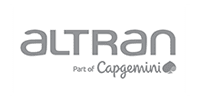B.S. Double Degree in Computational Physics and Computer Science
Practical method and in small groups.

Do you have any questions about what to study?
Hi! I'm Laura, and you can contact me to help you resolve them.
Want to make it real?
Fill out the form and receive the brochureDone!
Description
The most sought-after profile by companies
The Dual Bachelor’s Degree in Computational Physics and Software Engineering + U-tad’s Master’s Degree in Generative Artificial Intelligence combines knowledge in software, quantum computing, artificial intelligence, thermodynamics, mechanics, electromagnetism, and quantum physics to create the profile that technology companies are looking for to lead their most innovative projects.
You will work on system simulation projects for diverse sectors such as aerospace, automotive, materials science, new drug development, meteorology, and autonomous machines. You will develop cognitive assistants that interact with people, IoT devices for service customization, and be a pioneer in launching applications based on quantum computing.
With this dual degree, in 5 years you will graduate with highly valuable professional training:
An Official Bachelor’s Degree in Computational Physics
An Official Bachelor’s Degree in Software Engineering + Master’s in Generative Artificial Intelligence
At U-tad, we are committed to ensuring that our students stay at the forefront of technology. Our Generative AI program is designed to equip students with advanced skills in using development tools powered by Artificial Intelligence.
This course is offered during the first two years of the degree and focuses on the practical mastery of constantly evolving technological tools. Thanks to annual updates that align with advancements in AI, the students will be prepared to adapt to and capitalize on the latest innovations in the field.
You will study at the leading technological university center for digital education, with a strong connection to the business sector. Our training guarantees success, as our students rank among the top ten in the SEDEA (Spanish Association of Academic Excellence) rankings.
Train for a profession with 100% employability and great professional prospects.
- Location: U-tad Campus
- Schedule: Monday to Friday
- ECTS: 345
- Language: Spanish
- Modality: On-site
- Affiliated with: Camilo José Cela University
Career opportunities
By studying the Dual Bachelor’s Degree in Computational Physics and Software Engineering + Master’s in Generative Artificial Intelligence, you will be able to work in the following specialties:
- Expert in Finite Element Simulations
- Expert in Artificial Intelligence
- Chief Technology Officer
- Researcher/Developer of new algorithms for risk detection and fraud
- Scientific-Technological Consultant
- Project Management and Development in banking, finance, insurance, environment, medicine
- Researcher in Applied Physics Projects
- Quantum Computing Systems Developer
- Developer of Robotic Assistants for Healthcare
Where our students work
Upon completing this dual degree, you could work at companies such like:
- IBM
- GMV
- Minsait, an Indra company.
Partner companies



















Students' projects and awards
Your Project, Your Best Professional Presentation
Talent Awards
Students' feedback
We are very proud of our students because they stand out for their talent and daily effort. Additionally, the training received at U-tad provides them with solid knowledge to develop their careers in the sector they are most passionate about.



International mobility
At U-tad, we have an International Relations Department through which we coordinate and establish agreements with university institutions worldwide, as well as with official bodies responsible for international inter-university cooperation. We have agreements with prestigious universities across all five continents and are actively working to expand the number of institutions with exchange agreements, either through the Erasmus program or with bilateral exchange agreements.
Universities such as:
- Beijing Jiaotong University of Software Engineering (China)
- Soongsil University (South Korea)
- Epitech (France)
- Xi’an Jiaotong-Liverpool University (China)
- Malmo University (Sweden)
- Università degli Studi di Milano (Italy)
- Algebra University College (Croatia)
- UPAEP and UP (Mexico)
Faculty

Francisco Javier García Algarra
- Engineering Academic Director
- Academic Director and Teacher at U-tad
Study plan
| SUBJECT | ECTS | TYPE | DURATION |
| Web Development Fundamentals | 6 | B | 1st Semester |
| Introduction to Programming I | 6 | B | 1st Semester |
| Networking and Operating Systems Labs | 6 | OB | 1st Semester |
| Logic and Discrete Mathematics | 6 | B | 1st Semester |
| Creative Thinking | 3 | OB | 1st Semester |
| General Physics I | 6 | B | 1st Semester |
| Algebra | 6 | B | 2nd Semester |
| Computer Architecture | 6 | B | 2nd Semester |
| Calculation | 6 | B | 2nd Semester |
| Introduction to Programming II | 6 | B | 2nd Semester |
| Database and Distributed Systems Laboratory | 6 | OB | 2nd Semester |
| Digital Society | 3 | OB | 2nd Semester |
| Projects I: Digital Techniques and Technologies | 6 | OB | Annual |
Graphic legend: Basic Training (B) | Compulsory (OB) | Electives (OP) | Compulsory Minor Subject (OBM) | External Internships (PE) | Final Degree Project (TFG)
| ECTS | TYPE | DURATION | |
| General Physics II | 6 | B | 1st Semester | |
| Introduction to scientific programming | 3 | OB | 1st Semester | |
| Statistics | 6 | B | 1st Semester | |
| Object Oriented Programming | 6 | OB | 1st Semester | |
| Computer Networks | 6 | B | 1st Semester | |
| Operating Systems | 6 | B | 1st Semester | |
| General Chemistry | 6 | B | 2nd Semester | |
| Algorithm Analysis and Design | 6 | OB | 2nd Semester | |
| Databases | 6 | OB | 2nd Semester | |
| Software Design | 6 | OB | 2nd Semester | |
| Mathematical methods for physics | 9 | B | 2nd Semester | |
| Projects II: Software Engineering Trends | 6 | OB | 1st Semester |
Leyenda: Basic Training (B) | Compulsory (OB) | Electives (OP) | Obligatorias de Mención (OBM) | External Internships (PE) | Final Degree Project (TFG)
| SUBJECT | ECTS | TYPE | DURATION |
| Database Expansion | 6 | OB | 1st Semester |
| Fundamentals of Visual Composition | 3 | OB | 1st Semester |
| Partial Differential Equations | 6 | OB | 1st Semester |
| Distributed Systems Programming | 6 | OB | 1st Semester |
| Web Programming I, Client | 6 | OB | 1st Semester |
| Electromagnetism and Optics | 9 | OB | 1st Semester |
| Physics and Artificial Intelligence for Video Games | 6 | OB | 2nd Semester |
| Numerical Calculus | 6 | OB | 2nd Semester |
| Mobile Application Development | 3 | OB | 2nd Semester |
| Mechanics | 6 | OB | 2nd Semester |
| Experimental techniques | 3 | OB | 2nd Semester |
| Graphic Programming | 6 | OB | 2nd Semester |
| Web Programming II, Server | 6 | OB | 2nd Semester |
Leyenda: Basic Training (B) | Compulsory (OB) | Electives (OP) | Obligatorias de Mención (OBM) | External Internships (PE) | Final Degree Project (TFG)
| SUBJECT | ECTS | TYPE | DURATION |
| Thermodynamics and Statistical Physics | 9 | OB | 1st Semester |
| Machine Learning | 6 | OB | 1st Semester |
| Quantum Physics | 6 | OB | 1st Semester |
| Software Engineering | 6 | OB | 1st Semester |
| Artificial Intelligence | 6 | OB | 1st Semester |
| Immersive Systems | 6 | OB | 2nd Semester |
| Calculation of Probabilities | 6 | OB | 2nd Semester |
| Solid State Physics | 6 | OB | 2nd Semester |
| UX Fundamentals | 3 | OB | 2nd Semester |
| Fluid Mechanics | 6 | OB | 2nd Semester |
| OPTIONAL INSO | 3 | OP | 2nd Semester |
| Projects III: Web and App Development | 9 | OB | Annual |
| Low Level Programming | 3 | OP | 2nd Semester |
| Software Verification | 3 | OP | 2nd Semester |
Leyenda: Basic Training (B) | Compulsory (OB) | Electives (OP) | Obligatorias de Mención (OBM) | External Internships (PE) | Final Degree Project (TFG)
| SUBJECT | ECTS | TYPE | DURATION |
| Business Creation and Management | 3 | OB | 1st Semester |
| Project Management | 3 | OB | 1st Semester |
| Quantum Computing | 6 | OB | 1st Semester |
| Programming Paradigms | 3 | OB | 1st Semester |
| Computer Vision | 6 | OB | 1st Semester |
| Business and Digital Models | 3 | OB | 2nd Semester |
| Company Internship | 6 | PE | 2nd Semester |
| Special Effects Simulation | 3 | OB | 2nd Semester |
| Projects IV: Graphic Programming, Immersive Systems and Videogames | 9 | OB | Annual |
| Computational Physics Final Degree Project | 6 | TFG | Annual |
| Software Engineering Final Degree Project | 9 | TFG | Annual |
Leyenda: Basic Training (B) | Compulsory (OB) | Electives (OP) | Obligatorias de Mención (OBM) | External Internships (PE) | Final Degree Project (TFG)
- Location: U-tad Campus
- Hours: Monday – Friday
- ECTS: 240
- Language: Spanish or English
- Modality: In campus
- Centre Attached to: Camilo José Cela University
- Year of implementation: Planned implementation of double degree 2021-2022
- Software Engineering: Year of implementation: 2018-2019
- Spots for new students in the Degree: 60
- Branch of knowledge: Engineering and Architecture
*Computational Physics: degree pending verification by the Foundation for Knowledge madri+d
Minimum number of ECTS per type of registration and course:
| Minimum | Maximum | |
| Full time 1st course | 72 | 72 |
| Full time rest of courses | 30 | 84 |
| Part-time 1st course | 25 | 30 |
| Part-time rest of courses | 18 | 45 |
Related training
Request Information
Frequently Asked Questions
At U-tad, the Dual Degree in Computational Physics and Software Engineering + Proprietary Degree in Generative Artificial Intelligence is designed to train the professionals that technology companies demand. The program combines advanced theory and practical work, with projects in system simulation, generative AI development, and quantum computing. The training includes professional internships at technology companies such as IBM, GMV, and Minsait.
Most sought-after profile by companies: Graduates of this dual degree are highly in demand in fields such as computational simulations, AI development, quantum computing, and cognitive assistants. Leading technology companies seek these profiles to develop innovative projects in areas like autonomous vehicles, medicine, and finance.















